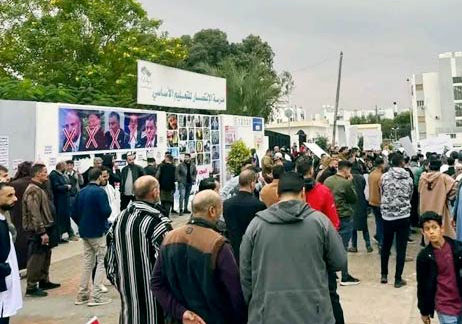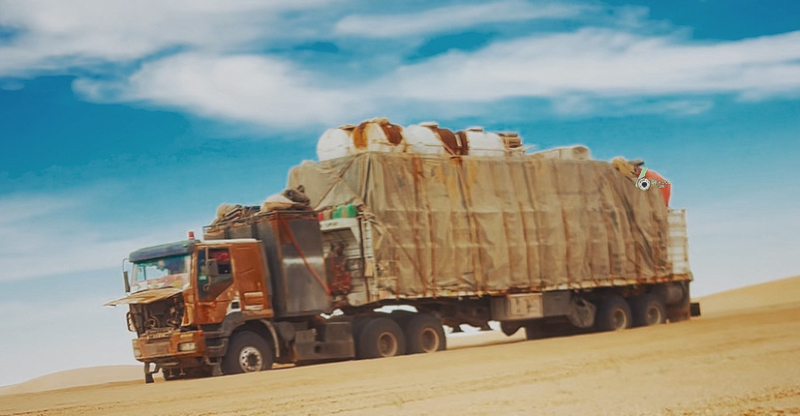Profile: 55 Brigade’s influential leader, Muammar al-Dhawi
Published on 2024 July 1, Monday Back to articles
55 Brigade’s leader, Muammar al-Dhawi
55 Brigade — which was previously known as the Wershefana branch of the Stability Support Apparatus (SSA) — has emerged into a militia led by Muammar al-Dawi (b.1985) and Brigadier Adel al-Taher Moftah Karim is its nominal commander. Actual command and control is retained by al-Dawi which reflects his significant influence, while Karim manages the relationship with the official army organs to benefit 55 Brigade.
The strategic western region of Wershefana — which was once devastated by Libya Dawn militias who accused its inhabitants of being loyal to Muammar Qadhafi’s previous regime — has been transformed into a beacon of stability and economic growth. It has also overcome the agonies of atrocities committed by Zawia and other Libya Dawn controlled towns and has sought reconciliation to achieve peace and stability. This transformation is particularly striking compared to neighbouring Zawia whose militias have invaded Wershefana many times since 2011 and committed serious violations and atrocities. While militias still operate there with impunity, frequently committing crimes and clashing violently, Wershefana enjoys peace and prosperity, which illustrates a significant turnaround from its past turmoil.
Muammar al-Dawi is officially part of GNU’s security forces and was involved in last week’s clashes with Zuwara militias over the Ras Ajdir border crossing crisis. Despite this he maintains strong relationships with various militias, including Zintan’s Major-General Osama al-Juweili and the Buzriba family led militia in Zawia. His influence extends through strategic alliances and familial connections including with Mohamed Bahroun (a.k.a. al-Far or the Mouse) (b.1989). The latter heads a powerful First Support Force of the Security Directorate militia in Zawia, in addition to being GNU’s head of Criminal Investigation Department of Zawia. Both men have been involved in human rights violations and criminal activity including human trafficking. Al-Dawi’s strong ties with Juweili initially aligned him with Fathi Bashagha’s parallel eastern based Government of National Stability (GNS). However, following Juweili’s ousting from Tripoli and Emad Trabelsi’s rise to the position of GNU Minister of Interior, al-Dawi defected from the Bashagha government. Subsequently, the GNU Ministry of Defence formally recognised al-Dawi’s militia and officially integrated it into the GNU in November 2022.
However, al-Dawi still maintains strong links with neighbouring Buzriba militias and even hosted Tripoli Revolutionaries Brigade leader Haitham al-Tajouri and Ayoub Aboras — a former leader of the Presidential Guard under the previous Government of National Accord (GNA) — at Aziziya with Juweili’s blessings. His younger brother Osama al-Dawi is currently serving as a minister in the parallel GNS. This complex network of relationships underlines al-Dawi’s strategic positioning within Libya’s political landscape.
The GNU has shown significant support for al-Dawi. High-profile visits to al-Dawi’s residence by Dbeibah and other ministers, as well as former officials, signal a concerted effort to bolster his image. He has been allowed to engage in various public relations activities, including inspecting schools and colleges, distributing awards, and visiting militia camps. This ‘polishing’ of his image has included interactions with controversial figures like Abdelrahman Milad al-Bija — a Coast Guard captain from Zawiya and a member of the Abuzriba clan — who is a UN sanctioned migrant smuggler who sought to regain legitimacy by engaged in counter-migration efforts. This further highlighting al-Dawi’s own involvement in fuel smuggling and migrants trafficking in addition to a nasty record of human rights violations.
Although there are no confirmed plans from Dbeibah regarding al-Dawi’s future roles, the latter is working to enhance his position both locally and across western Libya. He aims to secure loyal candidates for the next parliamentary elections and form alliances to attain a senior government role for himself or his close associates. Al-Dawi is also building his local power base by engaging with the political and economic elite of his Wershefana tribe and seeking contacts with influential foreign governments, including Türkiye, Egypt and the USA.
Under al-Dawi’s de facto leadership, 55 Brigade remains a key player in western Libya’s evolving power dynamics, with its commander navigating a complex web of local and international relationships to secure the brigade’s and his future.
This excerpt is taken from our Libya Politics & Security weekly intelligence report. Click here to receive a free sample copy. Contact info@menas.co.uk for subscription details.


